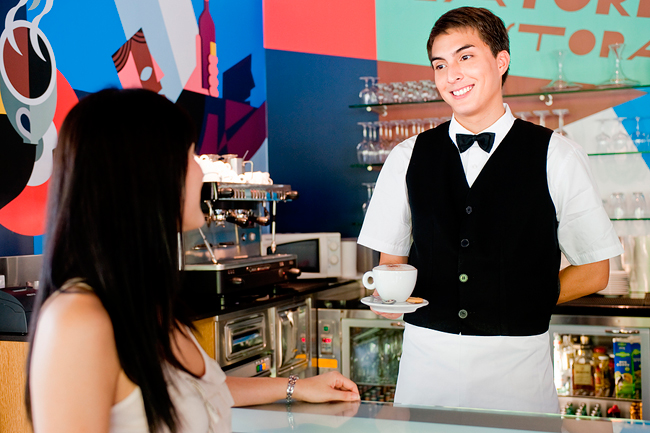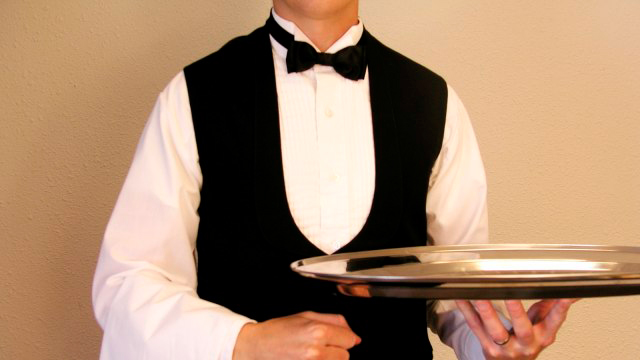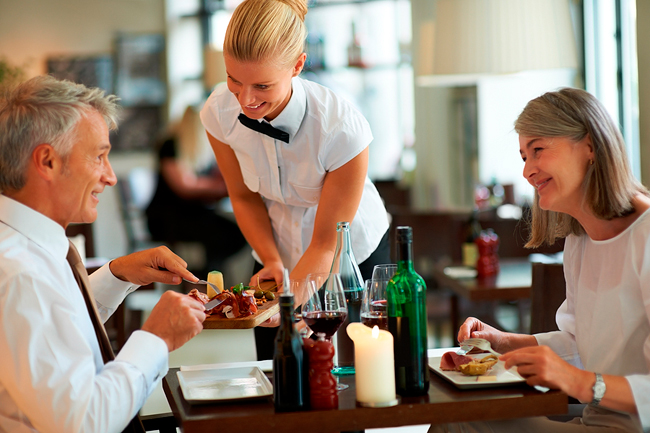Companies providing services strive to create good value for their consumers and, naturally, to make a profit. In modern times, these companies are faced by increasing customer expectations and growing competition and they can hope to achieve success only if they manage to create a superior offer and impress their customers.
Another important factor affecting the service industry and each individual either providing or receiving services of any kind are the Hi-Tech times we live in and the rapid pace of modern life. Many aspects of former culture are quickly falling into oblivion. In past times, courtesy was common and going to a restaurant was an important, much anticipated event. Today, all that is gone, especially among the younger generations.
Needless to say, when speaking of restaurants and other food serving establishments the first thing that anyone will notice and that which will leave the most lasting impression on any customer even today is the attitude of the person serving us, namely the waiter.
The profession of waiter falls within the domain of the restaurant business. The main activity in this profession is serving guests in various restaurants and food serving establishments. This job requires skills and abilities such as: courtesy, good body posture, neatness, good communication skills, good manners, patience, tolerance, and to a certain extent, even meticulousness.
What certainly stands for good service in any restaurant is when the waiters are:
Obliging but unobtrusive. A waiter should always be close at hand and in sight but no one wants him constantly fussing around the table and removing empty glasses. Restaurant etiquette requires at least one glass to be on the table, so the guests won’t feel rushed to leave.
Flexible. A waiter should always listen to the guest’s wishes and do his best to respond to them. For instance, if someone asks for a particular dish but without a certain ingredient usually to be found in such a dish, the waiter should remember this order and pass it on to the cook so the guest won’t feel slighted and end up being dissatisfied.
Familiar with the menu. When a guest asks what a certain dish consists
of or what the side dishes are or what a foreign word means, the waiter must know the answer. That will leave a very good impression with the guests at any establishment. Basic knowledge of the menu is the minimum requirement necessary to enable the guest to know what to order.
Efficient about serving the entire table. If several people arrive together for lunch (breakfast, dinner) it’s always important that they are served at more or less the same time, so half the people won’t have to sit and look at their friends or coworkers eating, not to mention the esthetic and professional effect of serving all the orders in quick succession, thereby also ensuring that all the guests will finish their meals at about the same time.
Pleasant. Meaning, of pleasant appearance (without body piercing and oily hair, and neatly dressed) as well as amiable towards the guests. An arrogant attitude is out of the question. Some may think that it’s alright for a waiter to be haughty and overbearing with the guests but most guests don’t like that and it’s certainly not the kind of attitude that will make them think well of an establishment.
The behavior of the guests is also important
Whether a guest will enjoy his or her time in a restaurant doesn’t depends only on the waiter and other staff but also on the behavior of the other guests.
 Just as the waiters should not be conceited and overbearing with guests, so also should the guests be civil when they are addressing the waiter. There is no need for a commanding or disparaging tone.
Just as the waiters should not be conceited and overbearing with guests, so also should the guests be civil when they are addressing the waiter. There is no need for a commanding or disparaging tone.
If you wish to summon a waiter just raise your hand and the waiter will come. Calling out to him or snapping your fingers to draw a waiter’s attention is rude. The most discrete way to beckon him is by making eye contact, after which a slight nod is enough to let the waiter know that you need him. Never pull a waiter by his sleeve or any other item of clothing.
If you come at a busy time for the restaurant and you are not sure what to order, to ensure a pleasant time there for all concerned avoid creating tension on all sides. For a start, it’s always a good idea to order drinks first and ask the waiter to bring you the menu if he hasn’t already done so. While he’s busy bringing you the drinks, you can look through the menu. The waiter will usually approach the table again within 3-5 minutes and ask if you need anything? That’s the time to order and state any other wishes you may have.
When it’s time to pay the bill, if you are satisfied with your visit to that restaurant, if you have enjoyed the food, service, and the general atmosphere, you can express your appreciation by leaving a tip.
In some cases, guests can depart from customary tipping habits depending on where they are. For instance, if you are in Europe, the service charge is usually included in the price of the meal. Still, the custom is to leave 5-10% of the amount on the bill as a token of appreciation, especially in sophisticated restaurants. However, if the service charge is not included in the bill, you should leave 15% of the total bill.
If you find yourself in Asia, an altogether different corner of the world,  tipping customs will vary from country to country.
tipping customs will vary from country to country.
In Japan, for instance, leaving a tip is offensive in any situation, while in China the staff will expect at least 3% of the total price of food and beverage.
In Hong Kong tips can go up to 15%, if service charge is not included in the bill.
THE WAITER’S LITTLE SECRETS
Whichever establishment they enter, guests expect to receive excellent service. In most establishments that is exactly what they will get. However, good and efficient service, and a courteous and amiable waiter are no guarantee of the waiter’s sincerity to the guests.
It’s always important to present the restaurant in the best possible light, so not all the little secrets and tricks of the trade will be conveyed to the guest because it’s important to keep every customer and make them wish to come back again.
The service will certainly be good but does that also go for the products you ask for? Here are several secrets the waiters don’t want their guests to know and some others they wish their guests did know.
WHAT THE GUEST SHOULDN’T KNOW
* The most frequent question that a waiter will ask when you are finishing your lunch or dinner is: “Would you like coffee?” Everyone should know that in the evening most restaurants serve only one kind of coffee, the kind most in demand. At this time of day you will most frequently be served decaffeinated coffee because it is what most people order after dinner. Naturally, the waiter will never tell you that you won’t get what you ordered because it’s not worth it to make more kinds of coffee and use several coffee machines, so expect to get an ordinary coffee, the kind that will also be served to all the other guests who expressed a desire to partake of this warm beverage at that time of day.
* Restaurants frequently buy ordinary salad dressing in jars or mayonnaise to which they add a few ingredients (like fresh herbs, cheese, mushrooms) which they present on the menu as being a house product, which is something the waiter will never tell you and, if you ask about the ingredients, he will sing its praises and describe it as an exquisite dressing, made according to an in-house recipe, the restaurant’s specialty, etc.
 * When a restaurant offers a dish as that day’s specialty that means the ingredients that go into it have to be used up quickly before they go bad. The waiter, on the other hand, will simply recommend it as the best choice for that day’s lunch/dinner.
* When a restaurant offers a dish as that day’s specialty that means the ingredients that go into it have to be used up quickly before they go bad. The waiter, on the other hand, will simply recommend it as the best choice for that day’s lunch/dinner.
* It is not advisable to order fish if you don’t know when it was delivered to the restaurant. Fish is usually delivered to restaurants twice a week and you should particularly avoid ordering it on Sundays.
* Generally speaking, we often ask the waiter about the quality and taste of a particular dish. Keep in mind that the waiter will recommend dishes even if he has never tasted them, nor has a clear idea of how they are made.
WHAT WAITERS WISH THEIR CUSTOMERS DID KNOW
* If you have been waiting for a meal order too long, it’s the cook’s fault, not the waiter’s!
* Avoid going to restaurants during holidays. They are usually overcrowded at those times and you will have to wait a long time for your order. The prices are often higher on those days, too!
* Waiters hate making a cup of tea. They have their hands full as it is and making a cup of tea, a cheap product, is time consuming while both the result and the profit are insignificant.
* Good waiters always wish their guests to enjoy their meal, but as soon as they finish it, let’s face it, all they want is for the guests to leave! After all, no one stays in a cinema once the movie is over.
Sanja Jovic







































 Srpski
Srpski English
English